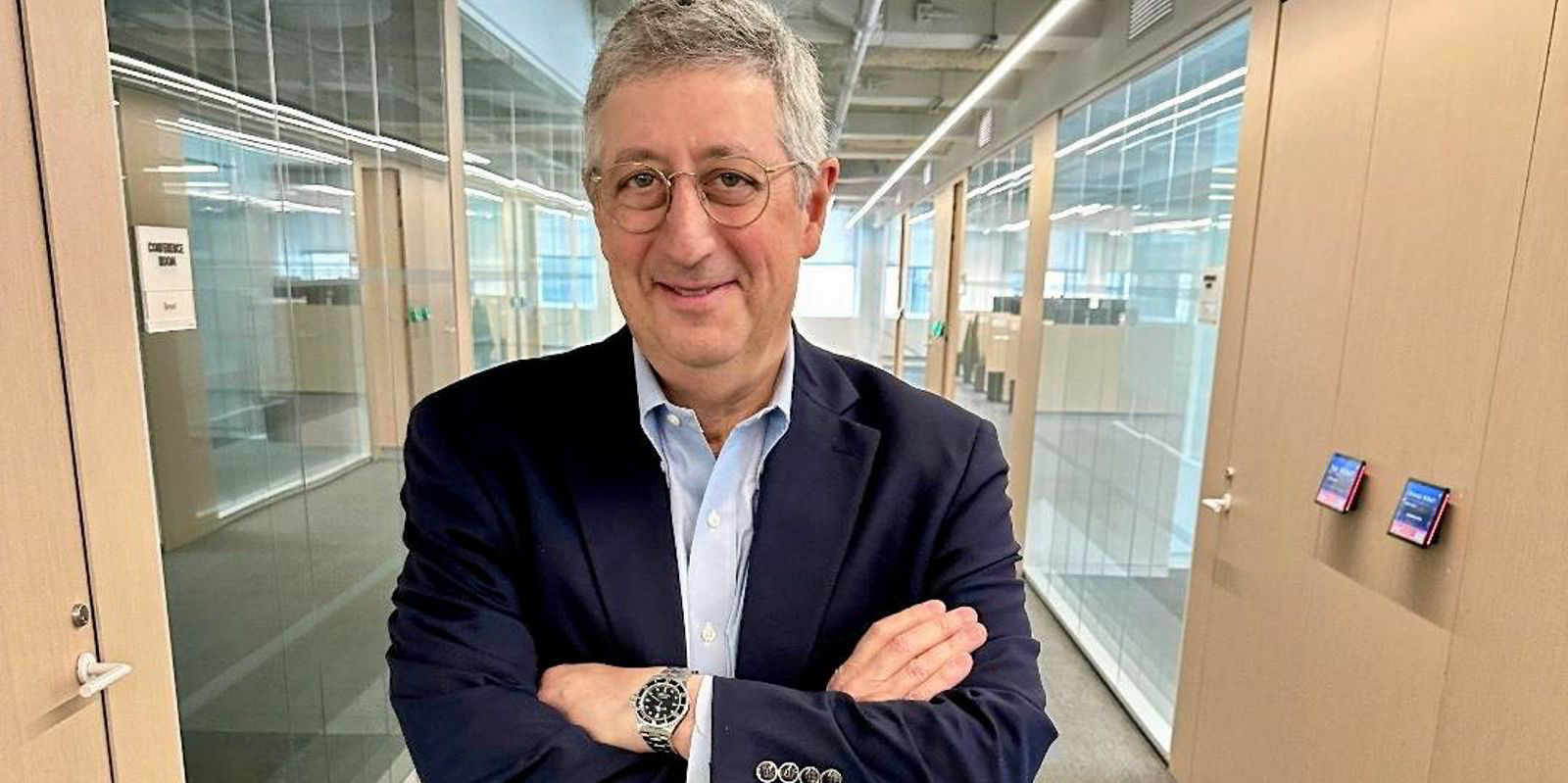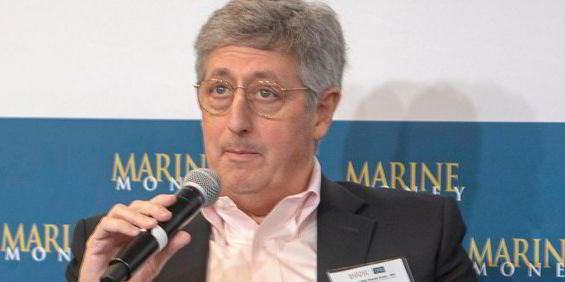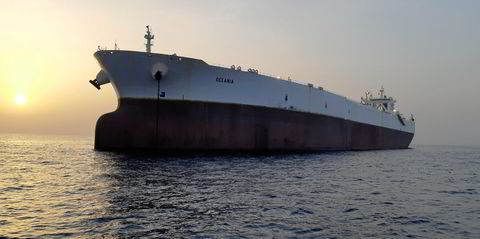Evan Cohen famously proclaimed in 2019 that he was taking CIT Bank’s maritime lending practice “out of warm lay-up”, and it was a fair analogy. The New York bank had gone 19 months without a head of ship lending before his appointment.
Cohen knows his way around a good quote, but it was so good that it’s hard not to continue the analogy and wonder where the ship is now when one gets an update from the former DVB executive, as Streetwise managed to do at his Manhattan offices.
Takeaways such as “under full steam” and “on a steady course” seem to be apt given the stability Cohen has brought to the operation since.
Consider that Cohen has built a staff of 15 and financed more than 300 ships in 46 deals for 36 clients, some of this while CIT was being acquired in a $2.2bn all-stock deal that closed in 2022 by First Citizens Bank of the US.
Cohen will have more to say about that as he appears on a financial panel at TradeWinds’ US Shipowners Forum in New York on Wednesday.
Still, there is one category in which the maritime operation, now carrying the First Citizens moniker, has barely made headway, and that is in portfolio size.
The outfit had built a shipping portfolio of about $1bn when TradeWinds caught up with Cohen in March 2021, and today it has grown to only $1.2bn — so might “slow steaming” or “at anchor” be a proper continuation of the analogy as well?
In truth, it’s more a sign of the times for ship lending. Shipowners in most markets are doing so well that they’ve made a point of repaying debt early and often, building fortress balance sheets and placing themselves in fine shape, but not to the full satisfaction of their lenders.
“Most lenders in the world face the same avalanche of repayment,” Cohen told us.
“Everyone’s running really hard just to stay in place. In the past two years, we’ve done more than $2bn in deals, yet we’ve increased the portfolio only incrementally because we’re also getting $2bn in repayments. So $1bn is a nice number but it’s not as big as you’d expect because of that level of repayment.”
Still, having been around shipping for more than 35 years, there is something else that Cohen knows.
“Shipping is a cyclical industry and we don’t expect that to last,” he said of the current champagne party.
So Cohen and his staff are keeping their heads down and doing what they do, which is classic senior-secured mortgage lending, primarily in the major vessel-operating sectors.
“Today we have 35 clients and we want to have 50. We have a team of 15 and we’d like to have 20. Our portfolio is $1.2bn and we’d like it to be $2bn. We’ve done 45 deals and we want to do 70,” Cohen said.
The maritime unit’s ability to achieve that type of growth has only been enhanced by First Citizens’ takeover of CIT, he said.
The US’ largest family-controlled bank, based in North Carolina, has been around for 125 years.
“They do not manage the company for quarterly earnings or the short term. They take a long-term view and that’s very sympathetic to how shipping and maritime looks at things. Our business fits the First Citizens culture,” Cohen said.
As TradeWinds has reported, First Citizens made a major move into the Greek market in June 2023 when it acquired $123m of loans once in the portfolio of HSBC.
The book covered 11 financings involving 14 vessels and eight clients.
The acquisition has helped First Citizens increase the portion of its portfolio devoted to Greek clients to about one-third, Cohen said.
“Having the bigger footprint and increased credibility, we have more deal flow,” Cohen said. “We have as much business as we can handle. We would like to do the same now in Scandinavia and other parts of Europe.”
First Citizens does about half its business in bilateral loans, which typically have a sweet spot of $35m to $50m for a first lending. Such reported lendings often have come with midsize owners, many of them privately owned.
The bank does an additional 25% of business in “club” deals with other banks and a further 25% in what Cohen described as syndicated loans.
In that capacity, First Citizens can take a piece of larger lending, and some have been with bigger public owners such as Scorpio Tankers and Genco Shipping & Trading. It has joined in with larger shipping banks such as Credit Agricole, BNP Paribas and DNB.

Cohen previously said the bank’s maximum advance ratio was typically 50% to 60%, but it is looking to the lower number as asset values have escalated.
Pricing has come down in general. “If I say 250 basis points is a normal place to start, that wouldn’t be crazy”. But the First Citizens acquisition also has helped the maritime unit become more competitive on margins, he said.
CIT had about $50bn in assets when it combined with First Citizens, which pushed deposits above $100bn. Then in the spring of 2023, First Citizens acquired distressed lender Silicon Valley Bank, once again doubling total assets to more than $200bn.
“Under First Citizens, we’re very long on dollars and have a competitive cost of funding, and we will take advantage of that,” Cohen said.
As an American lender, First Citizens also has somewhat different criteria when it comes to dealing with banking regulators than the largely European herd of traditional ship lenders.
“As a US lender, we’re much more focused on the cash-flow coverage in a loan as opposed to asset value, which European banks are more focused on.
The European banks also are facing increased regulatory pressure under the Basel IV protocols, and that again presents First Citizens with an opportunity to take a piece of exposure in a larger loan as partners face constraints, Cohen said.
First Citizens also continues to partner with private equity on deals where the shipowner is looking for higher overall leverage. One of the more prominent partners has been EnTrust Global, the financier run by two former CIT heads of ship lending: Svein Engh and Omer Donnerstein.
More ship finance news
London-listed bulker owner Taylor Maritime Investments is aiming to lift its stake in Singapore subsidiary Grindrod Shipping to 100%. Grindrod said it will carry out a selective capital reduction worth $49.6m. Click here to read.
Hafnia chief financial officer Perry van Echtelt sold shares worth NOK 20.2m ($1.9m) on the Oslo Stock Exchange on Thursday. The sale comes after the BW Group-backed product tanker owner began trading on the New York Stock Exchange. Click here to read.
Experienced shipping executive Henriette Hallberg Thygesen has re-emerged with two new board positions two months after bringing to an end a three-decade career at Danish giant AP Moller-Maersk. Click here to read.





